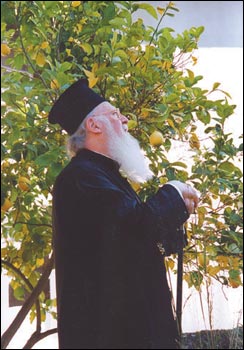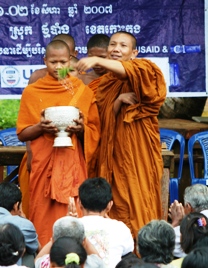UN and ARC launch programme with faiths on climate change
December 7 2007:
The United Nations has just launched an ambitious and innovative three and a half year programme to work with the world’s major faiths to tackle climate change.
The UN Development Programme (UNDP) and ARC will manage the programme which involves major traditions in eleven of the world’s faiths drawing up seven-year plans of action to be launched in early 2009 at Windsor Castle, and to run through to 2016.
Baha’i, Buddhist, Christian, Daoist, Hindu, Jain, Jewish, Muslim, Shinto, Sikh and Zoroastrian leaders will each be invited to commit their faith and their followers to projects and programmes that will address climate change and the protection of the natural environment in practical ways – from forestry conservation to organic farming schemes to introducing, promoting and financing alternative energy sources.
“This is an extremely exciting development which will have a real and long lasting impact on the health of the environment and on people’s lives,” said ARC’s secretary general Martin Palmer, who is working as a co-chair on this programme with the UNDP’s deputy director Olav Kjorven.
 |
 |
 |
The Ecumenical Patriarch of Constantinople is just one of the world's religious leaders who has stated a strong commitment to the environment |
“The support of the United Nations and its family of agencies will help strengthen the array of environmental work that many of the religions are already engaged in, as well as inspiring many new projects. The faiths offer stability and resilience in a world where too many initiatives fail through lack of deep roots. In confronting the issues surrounding the present concern for the climate, as well as other environmental topics, the faiths can bring leadership and networks respected worldwide. They can also bring a long-term perspective which will be based more on optimism than fear.”
ARC will help representatives of the faiths draw up their programmes and implement them throughout the world – from Sikh gurdwaras in India which provide food for millions of poor people every day, and which are aiming to introduce ecologically sustainable fuel sources to their kitchens, to Buddhist ecology centres in China, to Ethiopian monasteries teaching organic farming practices, to Catholic programmes to preserve Latin American forests, to Muslim fishermen protecting the seas off the coast of East Africa.
ARC will also help create partnerships between the major religions and secular bodies (such as the UN, national governments and NGOs), which are all concerned with climate change and environment issues.
This is the first time that the UNDP has engaged with the faiths on such a significant scale, although UNICEF has had “working with religions” as part of its mandate from the very beginning.
Why the Faiths?* The faiths are major land owners – they own more than 7% of the habitable land surface of the planet.
* The faiths are major providers of education and health care world wide.
 |
 |
 |
Buddhist monks in Cambodia are leading tree planting and forest protection initiatives |
* The faiths have vast media networks.
* The faiths together make up one of the largest investing groups in the world.
* The great faiths have astonishing outreach: and often faith leaders are trusted where government and military leaders are not.
*Each faith has clear teachings on caring for nature - which they are seeking to implement in practical projects.
Programme Focus1. Education
The faiths are amongst the largest providers of formal and informal education. They have significant publishing houses, training centres and youth programmes. The programme will develop this aspect in coordination with the proposed Youth Environment Corps, currently under discussion within the UN. The involvement and engagement of young people is crucial for the future of any environmental programmes.
2. Assets and Investments
The faiths are major owners of land including forests, farms, urban sites and sacred sites. The programme is designed to help develop best environmental practice on the land holdings ranging from a Religious Forestry Standard to organic farming training centres.
They are also huge investors and ARC has been working for the past seven years developing ethical investment programmes for the key religious investment groups. The significance of moving religious investments into sustainable and climate friendly industries cannot be overstated. The programme will work in tandem with ethical faith investment groups such as the Interfaith Center for Corporate Responsibility in New York and 3iG to develop programmes enabling the faiths to contribute to practical solutions such as alternative energy, waste disposal, water, paper and other forest products and housing.
3. Values
The faiths have networks, many of which espouse simple and sustainable lifestyles, values passed down over the millennia, endorsing an inherently pro-environment and pro-ethical way of life. Sometimes these messages have been lost, but many faith leaders are looking to remember and remind them.
4. Pastoral
The faiths have always had a considerable role in enabling change, adaptation and even migration. It is likely that all of these will happen as a result of climate change. As societies come under pressure - are restricted, lose traditional lands and sacred sites and face increasing poverty and marginalisation - the faiths will have a key role in holding communities together and in helping these communities reinvent themselves. While other groups move on after their ‘programme’ or ‘project’ has finished, the faiths are usually there for generations to come. We will seek to build upon that, so that as governments come and go and international priorities change, the faiths can provide stability for the people who suffer most from the impact of climate change.
5. Myth, metaphor and memory
The emphasis on consumption, economics and policy usually fails to engage people at any deep level because it does not address the narrative, the mythological, the metaphorical or the existence of memories of past disasters and the ways out. The faiths are the holders of these areas and without them, policies will have very few real roots. People need to understand why certain archetypes, myths and stories work and others do not. The “climate change activist” world and indeed the environmental world has all too often sought refuge in random use of apocalyptical imagery without seeking to harness the power of narrative. Without narrative, few people are ever moved to change or adapt. The faiths have been masters of this for centuries.
6. Equals, not mouthpieces
The faiths can contribute much to the UN’s goals as set out in the UNDP goals, objectives and pillars. However to see them as mouthpieces for any agencies’ policies would be to miss the opportunity offered by the partnership. The faiths will engage in these issues only because they make sense within their own world views, theologies and philosophies. The faiths can be the most powerful and significant partners if the way they are invited to contribute acknowledges their role and insights as well as their potential assistance to the programmes of others. This UNDP/ARC partnership has the potential to be the model for many other partnerships between the UN, World Bank, EU and other such multilateral bodies as well as with stakeholders, NGOs and other manifestations of civil society.
7. Celebration
Climate change and environment issues are often presented as scary, or at least doom-ridden and gloomy. Yet human psychology does not work well when only told how bad we are. The need to celebrate in order to appreciate better why we need to care for our planet, is something the faiths understand well and can help the often over-earnest secular groups to appreciate. Understanding the cyclical nature of festivals and lives also assists in helping build a profound environmental awareness into yearly rituals. We can want to protect the world because it is beautiful, not simply because it is useful – and with that as our value, we might perhaps protect it better.
Several other secular bodies will be working with us to work with the faiths, including Conservation International (CI), WWF-International and Faiths United for Sustainable Energy (FUSE).
|

